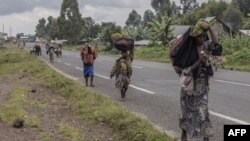In a statement on Tuesday, M23 spokesperson Lawrence Kanyuka said the rebels were "ready to start disengagement and withdraw" from occupied territory, even though they were not part of a summit during which this recommendation was made.
The group requested a meeting with the regional force to discuss modalities and renewed its request for a meeting with the mediator and facilitator, Kenya's ex-president Uhuru Kenyatta, who facilitated talks with other armed group and civil society leaders in Nairobi this week.
It also confirmed its commitment to a previously agreed ceasefire.
"The M23 reiterates its readiness to the direct dialogue with the DRC Government in order to find a lasting solution to the root causes of the conflict," Kanyuka said.
DRC authorities did not immediately respond to requests for comment.
The Tutsi-led militia has staged several offenses in east DRC this year, gaining ground in the vast mineral-rich country despite push back from government forces.
The fighting has uprooted thousands of civilians and sparked diplomatic tensions with neighbouring Rwanda, which Congo and United Nations experts accuse of backing the M23. Rwanda denies this.
The M23 insurgency stems from the long fallout from the 1994 genocide in Rwanda. The group was formed in 2012 claiming to defend the interests of Congolese Tutsis, the ethnic group that was targeted in the genocide and to which Rwanda's President Paul Kagame belongs, against Hutu militias.
The rebels made their first major comeback in March this year since they were pushed back in 2013.
Congo and Rwanda have both taken part in talks mediated by other African leaders to try to resolve the resurgent conflict. Ceasefires have been agreed and a regional force was announced in April to fight militia groups, but the conflict has continued.
The M23 had previously said it could not cooperate with measures agreed at talks from which it was excluded.







